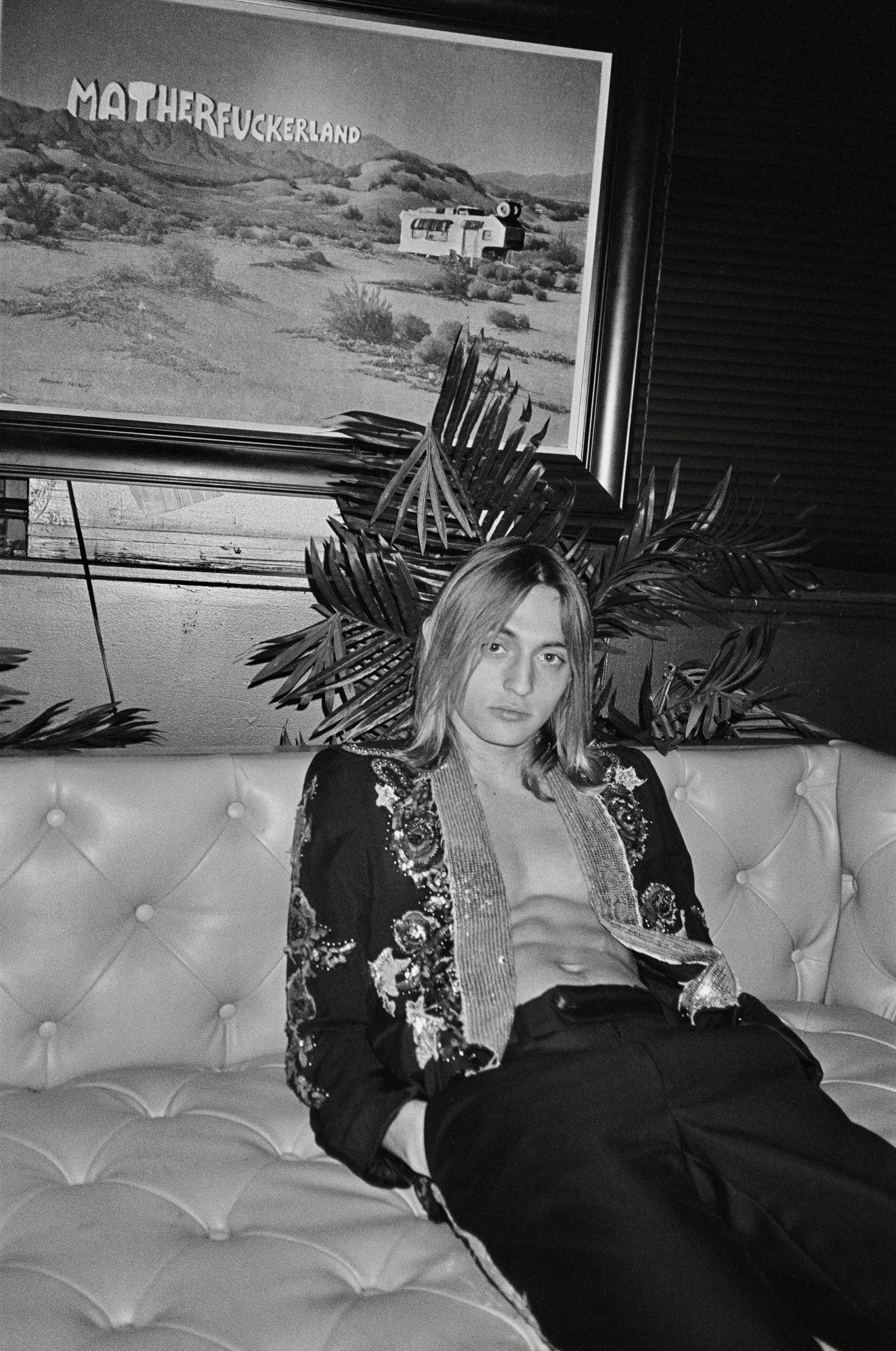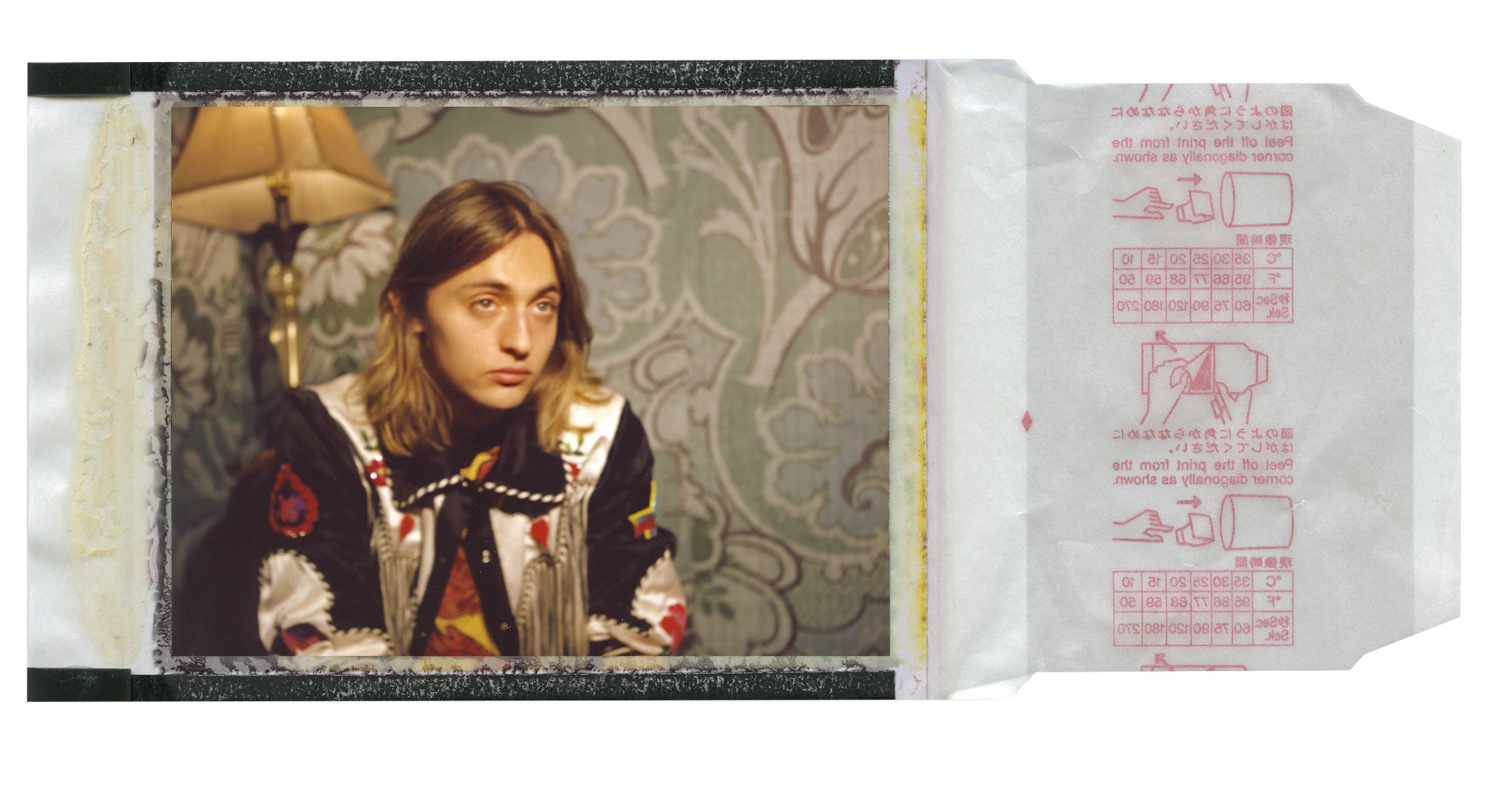There’s a romanticism to New York City that ties many who live there ceaselessly to the past. Like a time when vinyl was the only way to listen to music at home; when Greenwich Village bars, teeming with plumes of smoke, played host to folk-rock legends. It’s not the New York that Arsun Sorrenti knows — he’s only 19, after all — nor is it one he yearns for. “It’s not so much a thing of nostalgia,” the singer insists. Instead, this young luminary simply writes songs that feel tailor-made to bring that bygone era into the here and now.
He’s a musical anomaly in a family of prolific visual thinkers. “My household was creative when I was growing up, but it’s not like my dad was sitting me down and force-feeding me photography books,” the songwriter tells i-D. His father — for those who haven’t clocked on yet — is prolific imagemaker, Mario Sorrenti, though you get the impression there’s little that ties him to his son’s work anyway. “They were just nice, supportive parents who loved me a lot, and made sure I got a good education and that I got to explore all of the routes that I wanted to. Through that, I just realised that I really loved music.”

He’s speaking to us from his uptown New York home, “not far from Yonkers”: the place where that love of music now manifests. Arsun might’ve been raised on a diet of 1990s rock and The Beatles (his father and grandfather’s personal favourites), but it’s here that his own inspirations come to the fore; a continuation of an obsession that started when he was 13. “At some point, I started listening to a whole range of music: jazz, country, 50s and 60s music specifically. I love Bob Dylan, too!” He reels off his own interests — not your average playlist for someone who was born on the cusp of the new millennium. Eventually though, it was a single song that convinced him music would be his calling in life: Satellite of Love by The Velvet Underground — “the original demo, not the Lou Reed version,” he points out.
These days, Arsun wakes up in the same Bronx apartment every morning, makes himself a coffee and toys with the melodies that are embedded in his brain from the night before. That self-imposed musical exploration has worked wonders for this young artist’s sound. In an age of riotous protest rock that feels driven by politics and goes directly for the jugular, Arsun’s songs feel measured, a little more moody and wistful; the kind of thing you don’t hear much of anymore. Politics isn’t really something he wants to dwell on. Instead he’s hoping that people see it as sincerely as he does, “or honest enough to prompt people to look at themselves and the world around them in a positive loving light”. That cool, sanguine temperament pulsates from every note of his debut single White Light, which premieres here exclusively on i-D.
White Light is a rare moment of pop-spun energy for a kid who prefers to indulge in the slow and morose. “I seem to write a lot of ballads,” Arsun admits. His voice has this soothing ASMR-like droll that’s easy to get lost in. “They come more naturally to me.” White Light, he says, was lyrically inspired by Woody Guthrie’s This Land is Your Land before it wound up becoming the upbeat number that it is now. “We kicked it up a little!” he smirks.
It’s been a long time coming: two years, to be exact. “This weekend marks the anniversary of the beginning of all of my recording with the band,” Arsun says of his long-winded and considered route to releasing his first song. “It’s nice for the process to start becoming a public thing, because it’s been going on, for me, for so long, and I’m excited to let it out.”
The handful of songs Arsun has under his belt are recorded with analogue equipment, straight onto tape rather than through the computer-whizz ways of modern music. He talks about the particulars of his classic technique in befuddlingly intelligent detail, but his reason for taking that route is pretty simple: “I strive so much for that sound because people didn’t cut corners with making stuff back then,” he says. “A lot of people get hung up on certain aspects of recording to tape, but for me, recording with analogue is more about sound quality than romanticism, you know?”
His songwriting process is, at his own admittance, pretty slow, but perhaps that stems from his desire to only take time to live in the songs he loves. We discuss the pop scene, in which massive camps of writers somehow find the time to churn out close to 200 songs for one record. “That’s crazy to me, really!” Arsun laughs. “I maybe write 7 or 8 songs a year that I like, and most of them get thrown out.” A duo of songs set to be released shortly after White Light for example, were written when he was 15; he’s just held on to them ever since.
Because of his background, Arsun is inevitably going to become a scapegoat for rock purists, but with a real dedication to the music he makes and a desire to throw something interesting into the fold, he may well break past that and become a fresh, welcome face on New York’s tight-knit rock scene. After all, he’s got that vital, intrinsic connection to his craft; the one that makes his bones shake each time he encounters something brilliant. He gets it when he listens to classic country. He got it just yesterday, when he sat at his piano and found himself playing the melody for Greensleeves; a song the 19-year-old realised had made it from the time of Henry VIII, all the way through to 2018 with barely a note being altered. “These songs can last forever,” Arsun remarks, practically purring his words. “I listen to music every single day, and every single day, I get that feeling.”

